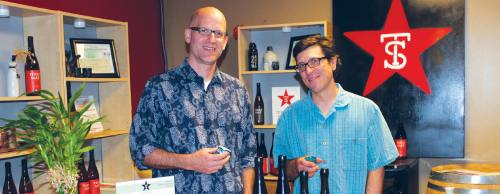The alcohol evolution in Austin reached another milestone in December when Texas Sake Co., the state’s only sake brewery(1), re-emerged onto the market.
Once left for dead, co-owner Adam Blumenshein and business partners took over the fledgling operation on North Lamar Boulevard in 2014.
 By the end of March, Texas Sake Co. will have four products on sale, including its junmai and junmai nigori sake batches sold in different-sized bottles.[/caption]
By the end of March, Texas Sake Co. will have four products on sale, including its junmai and junmai nigori sake batches sold in different-sized bottles.[/caption]“All the equipment had already been disassembled to be sold, and at the last minute we came in and bought the whole company,” said Blumenshein, an Austin resident since 1993 who also operates Strange Land Brewery in West Austin.
Shortly after buying the company, he pulled all Texas Sake Co. products from the shelves and hired sake master brewer(2) Jeff Bell to lead production. The duo at first envisioned a local, organic sake that would appeal to craft brew loyalists, but the end product did not taste right, Blumenshein said.
Now using a California rice strain that originated in Japan, Blumenshein and Bell agree they have reached an ideal flavor.
“Now we’ve found sort of a middle approach that is inspired by tradition but not bound by it,” Blumenshein said.
 After attempting a local, organic approach, Texas Sake Co. opted to use a California rice strain that originated in Japan to make the company’s sake.[/caption]
After attempting a local, organic approach, Texas Sake Co. opted to use a California rice strain that originated in Japan to make the company’s sake.[/caption]Sake takes twice as long as beer to ferment, said Bell, who grows mold on rice(3) to make the base product needed to create sake. That base product is then built up(4), and that process is repeated as needed until the mix is ready to be pressed. Then the sake is filtered, pasteurized and sits for up to four weeks to clear out sediment, he said.
“Sake hates to be fermented warm, so we try to ferment each batch as cold as possible,” Bell said.
Texas Sake Co. recommends serving its products at room temperature, on the rocks or mixed as a cocktail. The company’s introductory product(5) debuted in nearly 50 major Texas retailers in December, and a second, more cloudy sake(6) will hit shelves by early to mid-January.
 “We’ve positioned ourselves quite nicely to convert those chardonnay drinkers,” Blumenshein said. “I really have found those are the first converts.”
“We’ve positioned ourselves quite nicely to convert those chardonnay drinkers,” Blumenshein said. “I really have found those are the first converts.”
By the end of March, Texas Sake Co. will also distribute smaller bottles of its flagship products to restaurants. By then, Blumenshein hopes to have already won over a few skeptics.
“There’s a balance because sushi bars will see we’re not traditional,” he said. “However, they will see the benefit of having a local product that can overcome not being from Japan.”




